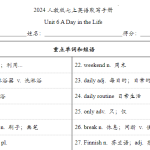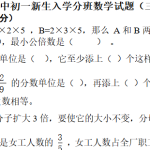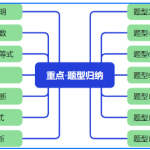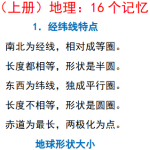2024新人教版七年级上册语境学单词
2024新人教版七年级上册语境学单词
新人教七年级Vocabulary in each unit语境学单词
Starter Unit1
- unit 用作名词(n.)
This textbook has twenty units. 这本课本有二十单元。
The family is the smallest social unit. 家庭是社会最小的单位。
2.starter unit
3.section 用作名词 (n.)
White lines divide the playing area into sections. 这些白线把赛区分成各个部分。
She lives near the business section. 她住在商业区附近。
The surgeon performed a section on the vein. 外科医生施行了静脉切开手术。
4.greet 用作及物动词 (vt.)
I greet you in the name of the President. 我代表总统前来迎接您。
They greet each other with a hug and say Merry Christmas!他们互相拥抱,互相问候圣诞快乐!
Tom gravely steps forward to greet us. 汤姆庄严地走过来,向我们致意。
5.spell 用作动词 (v.)
I don’t know how to spell your name. 我不会拼写你的名字。
Her writing is neat, but she can’t spell. 她的书写很工整,但是她不会拼写。
Put them all together, and they spell MOTHER. 把它们拼在一起。
6.start 用作动词 (v.)
It started to rain. 下起雨来了。
I used to start work at 9 o’clock every day. 我过去常在每天9:00开始工作。
We are just about to start. 我们正要出发。
7.conversation 用作名词 (n.)
I listened to their conversation. 我倾听他们的谈话。
Did you have a conversation with him? 你和他谈过话了吗?
The band drowned our conversation. 乐队的演奏声把我们谈话的声音淹没了。
8.oh 用作感叹词 (int.)
Oh, Xiao Fang, I didn’t hear you come in. 哦,小方,你进来我都没听见。
Oh, she really is getting above herself! 哦,她确实变得越来越自高自大了。
9.bell 用作名词 (n.)
The church bell tolled the hour. 教堂的鸣钟报时。
I was roused by the sound of the bell this morning. 今天早晨,我被铃声唤醒。
I was too preoccupied to hear the bell. 当时我出神地想着心事,没有听见门铃响。
Starter Unit2
- bottle 用作名词(n.)
Why don’t we crack open a bottle of champagne to celebrate?
我们何不开瓶香槟酒庆祝一下呢?
- eraser 用作名词(n.)
The eraser is in the pencil-box. 橡皮擦在文具盒里面。
Life is to paint without an eraser. 生命是绘一幅画,手中却无橡皮擦。
- key 用作名词(n.)
The key to an entertainer’s success is personality.一个演员成功的关键在于他是否有个性。
I have mislaid my key to the door. 我不知道把门钥匙放到哪里了。
Do you know the key to the question? 你知道问题的答案吗?
- thing 用作名词(n.)
That was the only thing they could count on. 那是他们唯一依靠的东西。
However, teaching is by no means an easy thing. 然而,教书并不是件容易的事情。
We have a few kitchen things and a dining room set. 我们有一些厨房用具和一套餐厅设备。
- need 用作动词(v.)
You look tired. You need a good rest. 你看来累了。你需要好好休息一下。
You need some warm clothes for the winter. 冬天来了,你必须准备一些保暖衣物。
I need to spend more time studying. 我必须花更多时间来学习。
用作名词 (n.)
The doctor told me I was in need of a good rest. 医生对我说,我需要好好休息。
I feel a need to talk to you about it. 我觉得有必要跟你谈谈那件事。
- you’re welcome
Starter Unit3
1.fun 用作名词 (n.)
You’ll sure to have fun at the party tonight. 你在今晚的晚会上一定会玩得很开心。
Laugh is an expression of happiness, joy, silliness or fun. 笑是用来表达幸福,喜悦,可笑或玩笑等的表情!
用作形容词 (adj.)
Swimming in the sea is great fun. 在海里游泳很好玩。
2.yard 用作名词 (n.)
We planted some elms in the yard. 我们在院子里种了一些榆树。
He parked his car in the yard. 他把车停在院子里。
3.carrot 用作名词 (n.)
Have some more carrot. 再吃点胡萝卜。
The dish of boiled beef and carrot tastes good. 那道清炖牛肉胡萝卜的菜味道不错。
4.goose 用作名词 (n.)
The goose hissed at me angrily. 那鹅愤怒地向我发出嘶嘶声。
They often have goose at Christmastime. 他们在圣诞节时常常吃鹅肉。
5.count 用作动词 (v.)
It’s not humanly possible to count so quickly.计算得这么快是人力无法做到的。
6.another 用作形容词 (adj.)
It is just as well that you took another road. 还好你们走了另一条路。
Will you like another cup of tea? 你要再来一杯茶吗?
用作代词 (pron.)
I don’t like this one. Please show me another. 我不喜欢这个,请给我另一个。
7.else 用作副词 (adv.)
Ask somebody else. 问问别人。
Would you like anything else to drink? 你还要喝点别的什么吗?
8.look at
Don’t look at me like that. 别那样看着我。
He looked at it with dilated eyes. 他睁大了眼睛看它。
Please raise your head and look at the blackboard. 请抬起头来,看黑板。
Unit1
1.make friends
You must join a club and make friends. 你必须加入一个俱乐部并交朋友。
Mrs. Smith is too contrary to make friends easily. 史密斯太太过于固执而不易交朋友。
2.get to know
How did you get to know that I was here? 你怎么知道我在这里?
You’ll like her once you get to know her. 你一旦了解她,就喜欢她了。
3.each 用作代词 (pron.)
We each have our private views about it. 我们每个人对这件事都有自己的看法。
We each paid our share of the bill for the meal. 我们各自付了自己应付的那份饭钱。
用作形容词 (adj.)
Each day passed without any news. 每天都没有任何消息。
Each man has his own name.每个人都有自己的名字。
4.other 用作形容词 (adj.)
My other sister is a doctor. 我的另一个妹妹是医生。
My office is on the other side of town. 我的办公室在市区的另一边。
用作代词 (pron.)
The children are always bickering about something or other. 孩子们有事没事总是在争吵。
5.each other 用作代词 (pron.)
The teams are all square at one match each. 这些队在各自参加了一场比赛后不分胜负。
6.full 用作形容词 (adj.)
The bottle is full of water. 瓶子里装满了水。
The roses are in full bloom. 玫瑰花盛开了。
7.full name
Fill in your full name and address. 填写全名和地址。
The writer’s full name appears on the title page of the book. 作者的全名在内封上出现。
8.grade 用作名词 (n.)
He is in the third grade. 他读三年级。
He received a failing grade on the term paper. 他的期末报告不及格。
9.last name 用作名词 (n.)
Smith is a very common last name in England. 在英国史密斯是很常见的姓。
How do you spell your last name? 你的姓是怎样拼写的?
10.classmate 用作名词 (n.)
He is my classmate of junior middle school. 他是我初中时的同班同学。
11.class teacher
Our class is in the charge of our class teacher. 我们班由班主任管理。
He told me he was afraid of his head teacher. 他告诉我他害怕他的班主任老师。
12.first name 用作名词 (n.)
Mrs Thatcher’s first name is Margaret. 撒切尔夫人的名字叫玛格丽特。
The child was named after its father, given its father’s first name.这个小孩以他父亲的名字而命名。
13.mistake 用作名词 (n.)
You’ve made several grammatical mistakes in the composition. 你的作文中犯了几处语法错误。
Tom must have taken your dictionary by mistake. 汤姆一定是弄错了才拿了你的字典。
14.country 用作名词 (n.)
China is a developing country. 中国是一个发展中国家。
After many years abroad, he wanted to return home to his country. 在国外多年后,他想回到故乡。
15.same 用作形容词 (adj.)
Father sits in the same chair every evening. 父亲每晚都坐在同一张椅子上,
16.twin 用作形容词 (adj.)
I always confounded him with his twin brother. 我总分不清他和他的孪生兄弟。
用作名词 (n.)
I can’t tell one twin from the other. 我分不出双胞胎中谁是谁。
17.both 用作形容词 (adj.)
Both his eyes are hurt. 他的两眼都受伤了。
用作代词 (pron.)
Both are good. 两者都好。
Both of us knew it. 我们两个都知道这件事。
18.band 用作名词 (n.)
The band played a lively tune. 乐队演奏了一支轻快的乐曲。
They are a teenager band made up of four cool boys. 他们是一支由四名酷哥组成的少年演唱队。
19.pot 用作名词 (n.)
Will you help me to wash up all these pots and pans? 帮我洗洗这些锅碗瓢盆好吗?
20.a lot 用作名词 (n.)
The boy had a lot of pocket money. 这男孩有许多零用钱。
Tom fooled a lot of people into believing him. 汤姆骗得很多人相信他。
21.tofu 用作名词 (n.)
He can make many dishes with tofu.他会用豆腐做很多菜。
22.parrot 用作名词 (n.)
The boy had a parrot on his right shoulder. 男孩把一只鹦鹉放在右肩上。
23.guitar 用作名词 (n.)
He plays the guitar and sings too. 他会弹吉他,也会唱歌。
It is fun to play the guitar. 弹吉他是好玩的。
24.tennis 用作名词 (n.)
Do you play tennis? 你打网球吗?
I want to buy a new tennis bat. 我想要买一个新网球拍。
25.post 用作名词 (n.)
Your duties include checking and dispatching the posts. 你的职责是检查和发送邮件。
用作动词 (v.)
I would be quite grateful if you would post this letter. 要是你肯寄这封信,我将十分感激。
Advertisements have been posted up everywhere announcing the new show. 到处贴满了广告宣传这一新节目。
26.even 用作副词 (adv.)
Even as he spoke, she entered. 正当他说话时,她进来了。
He even more likes to drink wine and not to like beer. 他更愿意喝葡萄酒而不喜欢啤酒。
27.hey
Hey, I almost forgot! John asked you to give him a ring. 嗨,差点儿忘了!约翰请你给他打个电话。
28.play the guitar
John will play the guitar if Mary will. 如果玛丽演奏吉他的话,约翰也将演奏吉他。
I write my own songs and I play the guitar as well.我唱自己谱曲的歌,也弹吉他。
29.would 用作助动词 (aux.)
It would take about 30 minutes. 大概要开30分钟。
Would you help me with the report? 你愿意帮我写报告吗?
30.would (’d) like to
31.information 用作名词 (n.)
They were unable to provide much information. 他们不能提供很多信息。
We are able to get the information we need from the Internet. 我们可以从网上得到我们需要的信息。
32.hobby 用作名词 (n.)
One of my hobbies is painting. 我的业余爱好之一是画画。
His hobby employs much of his time. 他的业余爱好占用他许多时间?
33.Green 用作名词 (n.)
Mr. Green spoke highly of our city. 格林先生很称赞我们的城市。
34.UK
UK nationals get the vote at 18. 英国国民18岁始有选举权。
35.US
36.Smith
Mr. Smith is our teacher. 史密斯先生是我们的老师。
37.Lisa
Lisa is crying. What’s up with her? 莉萨在哭,她怎么了?
38.Tom
Tom is very proud of his new car. 汤姆非常满意自己的新车。
39.hot pot
Check out Japanese paper hot pot! 试试看日式纸火锅吧!
40.Sally
41.Wood
42.Sydney
It is a long flight from Sydney to Beijing. 从悉尼到北京飞行时间很长。
43.Australia
My foreign teacher came from Australia. 我的外籍教师来自澳大利亚。
Sydney is the largest city in Australia. 悉尼是澳大利亚最大的城市。
43.Mapo tofu
44.Beijing roast duck
45.Singapore
Is Singapore a tropical country? 新加坡是热带国家吗?
46.Pauline
47.Lee
48.Coco
49.London
Tell me about all your doings in London. 告诉我你在伦敦所做的一切。
Mary has booked a flight from New York to London. 玛丽已预订了从纽约到伦敦的飞机票。
Unit2
1.mean 用作动词 (v.)
What does this word mean? 这个单词是什么意思?
I mean to call on you tomorrow. 我打算明天看望你。
2.husband 用作名词 (n.)
My husband is a stamp collector. 我丈夫是个集邮者。
3.bat 用作名词 (n.)
The other boys coveted his new bat. 其他的男孩都想得到他的新球棒。
I want to buy a new tennis bat. 我想要买一个新网球拍。
4.ping-pong bat
5.play ping-pong
6.every day
She wears sandals every day in summer. 夏天她每天都穿凉鞋。
Newspapers are delivered every day. 报纸每天都送来。
7.together 用作副词 (adv.)
They traveled together. 他们一起旅游。
8.fishing rod 用作名词 (n.)
I’ll go and get my rod and tackle box now. 我现在就去拿我的钓竿和钓具箱。
9.spend 用作动词 (v.)
You really shouldn’t spend so much effort on it. 你真不该在这件事上花费这么大的精力。
How do you spend your spare time? 你业余时间怎么打发?
10.a lot of / lots of
11.really 用作副词 (adv.)
It’s really cold today. 今天可真冷。
Go ahead. Do whatever you really love. 去吧,去做你真正喜爱的事。
12.activity 用作名词 (n.)
We love outdoor activity. 我们热爱户外活动。
13.chess 用作名词 (n.)
I’m not very fond of playing chess.我不太喜欢下棋。
I like to play chess with my father. 我喜欢和爸爸一起下国际象棋。
14.Chinese chess 用作名词 (n.)
I entered a chess competition and finished third. 我参加了象棋比赛名列第三。
Henry is keen on playing Chinese chess. 亨利很喜欢下象棋。
15.funny 用作形容词 (adj.)
The story was very funny. 这个故事非常可笑。
My funny drawings amused the children. 我的滑稽的图画把孩子们给逗乐了。
16.laugh 用作动词 (v.)
It is natural to laugh when you are happy. 高兴时笑是正常的。
You should not laugh at the handicapped. 你们不应该嘲笑残疾人。
用作名词 (n.)
Her laugh was as grateful to him as a summer wind. 她的笑声对于他好像夏天的风一样令人愉快。
17.different 用作形容词 (adj.)
He’s a different man from what he was 10 years ago. 他和十年前不一样。
My husband has several shirts of different colors. 我丈夫有好几件颜色不同的衬衫。
18.violin 用作名词 (n.)
He plays the violin for the fun of it. 她拉小提琴只是为了好玩。
The audience lapped up the violin solo. 观众对小提琴独奏反应热烈。
19.have fun
Have fun getting to know each other. 在相互了解对方的过程中玩得开心。
The children had fun at the carnival. 孩子们在狂欢节上玩得开心。
20.pink 用作形容词 (adj.)
Write your name and address on this pink slip. 在这张粉红色纸条上写下你的姓名和地址。
用作名词 (n.)
The sunset has tinted the sky with pink. 落日把天空染成了粉红色。
Pink is her favorite color. 粉红色是她最喜欢的颜色。
21.hat 用作名词 (n.)
She bought a hat yesterday. 她昨天买了一顶帽子。
The magician conjured a rabbit out of his hat. 魔术师从他的帽子里变出一只兔子。
22.handsome 用作形容词 (adj.)
Her husband is a very handsome young man. 她丈夫是一个非常英俊的年轻人。
23.knee 用作名词 (n.)
I’ve bumped my knee on the wall. 我的膝盖撞上了墙壁。
His left knee was hurt in a traffic accident. 他的左膝在一次交通事故中受伤了。
24.at night
My baby often wakes up several times in the night. 我的孩子常在夜里醒来。
25.in the middle
He planted roses in the middle of the garden. 他在花园中间种上玫瑰。
26.grandchild 用作名词 (n.)
His grandchild is a naughty boy.他的孙子是个淘气的男孩。
He loves his grandchild very much.他非常喜欢他的孙儿。
27.son 用作名词 (n.)
His wife born him a son.他妻子给他生了一个儿子。
I haven’t heard any news from my son lately. 我最近没听到我儿子的任何音讯。
28.next to
He saw a magazine on the table next to him. 他看见他邻近桌上有一本杂志。
She sat in the chair next to mine. 她坐在紧靠着我的一张椅子上。
29.hike 用作名词 (n.)
The storm upset their plans for a hike. 暴风雨破坏了他们的远足计划。
用作不及物动词 (v.)
He wants to hike round the world. 他打算徒步旅行环游世界一周。
30.go hiking
I will go hiking my parents’ decision. 我是否去徒步旅行要看父母的决定。
If it doesn’t rain tomorrow, we shall go hiking. 如果明天不下雨我们就要去徒步旅行。
31.David
I tried to dissuade David from accepting the job.我试图说服戴维不要接受这份工作。
32.Jim
You can always count on Jim.你可以永远相信吉姆。
33.Kate
Your letter for me might be in care of Kate. 你写给我的信可由凯特转交。
34.Lily
35.Ireland
People flooded from Ireland to America. 人们自爱尔兰大举涌入美国。
This new book deals with the troubles in Ireland. 这本新书论述爱尔兰的纠纷。
36.Fred
A strange man, Fred by name, came to see me.有个名叫弗雷德的陌生人来找我。
37.Sam
Sam lives at number 20 Park Street. 山姆住在派克街二十号。
Sam eats cereal for breakfast every day. 山姆每天早餐吃谷类食品。
38.Jane
He is going to marry Jane in May. 他打算五月和简结婚。
39.Jack
Jack worked his way through college by waiting tables. 杰克在餐馆当侍者,半工半读地念完了大学。
40.Sarah
Sarah is carrying out research on modern art. 莎拉正在研究现代艺术。
41.Oscar
Oscar got up and tramped out of the kitchen. 奥斯卡站起身悻悻地走出厨房。
The film shall be a candidate for Oscar. 这部影片应该入围奥斯卡金像奖。
42.Lucy
Lucy has been whaling away on the typewriter for two hours. 露西不停地打字,已有两个小时了。
Unit3
1.hall 用作名词 (n.)
The lecture is to be delivered at the hall. 演讲将在大厅进行。
There were plenty of people in front of the town’s Hall. 在城镇的大礼堂前有许多人。
2.dining hall 用作名词 (n.)
This is my first time to eat in your dining hall.这是我第一次在你们的餐厅用餐。
3.in front of
I drove up in front of the house and honked. 我将车开到屋子前面然后按喇叭。
A still better tomorrow lies ahead of you.展现在你们面前的是更加美好的未来。
4.building 用作名词(n.)
The building faces north. 这栋建筑物朝北。
Houses and churches are buildings. 房子和教堂是建筑物。
5.across 用作副词 (adv.)
Can you swim across the river? 你能游到河的对岸吗?
The post office is just across from the club. 邮局就在那俱乐部对面。
用作介词 (prep.)
A bridge across the river must be built. 必须造一座跨越这条河的桥。
My house is just across the street. 我家就在对街上。
6.across from
The bus stop is just across the street. 公共汽车站就在街对过。
The post office is just across from the club. 邮局就在那俱乐部对面。
7.field 用作名词 (n.)
Many farmers are working in the fields. 许多农民在田里干活。
Children went on a picnic and played in a field. 孩子们去野餐,在田野上嬉闹。
8.sports field 用作名词 (n.)
The sports field will be on your left. 运动场就在你的左边。
9.gym 用作名词 (n.)
The basketball players are working out at the gym. 篮球运动员们正在体育馆进行训练。
We go to play badminton in the nearest gym every Sunday. 每个星期天我们都去最近的体育馆打羽毛球。
I did a two-hour workout in the gym. 我在健身房锻炼了两个小时。
10.office 用作名词 (n.)
He keeps his office neat and tidy. 他保持办公室清洁整齐。
Our office is in the centre of the town.我们的办公楼在市中心。
11.large 用作形容词 (adj.)
Shanghai is a large city. 上海是一个大城市。
You should change from the small to a large size. 你必须把这件小号的衣服换成大号。
12.special 用作形容词 (adj.)
She is a special friend of mine. 她是我一个特别的朋友。
If needed, give us your special requirements. 如果需要,告诉我们您的特殊要求。
13.smart 用作形容词 (adj.)
I’m a smart girl that speaks with a smart accent. 我是个机灵的姑娘,说话带有时髦的腔调。
This boy is very smart; he may be another Edison. 这男孩很聪明,他可能成为另一个爱迪生。
14.whiteboard 用作名词 (n.)
The team must also have a whiteboard close. 附近还要有书写板。
15.put up
They are putting up several new buildings in that block .他们正在那一街区建几幢楼房。
16.important 用作形容词 (adj.)
He has made an important contribution to the company’s success. 他对公司的成功做出了重要的贡献。
It’s very important to teach the children about road safety. 把交通安全常识教给孩子们是非常重要的。
It was one of the most important discoveries ever made. 这是所做出的最重大的发现之一。
17.notice 用作及物动词 (vt.)
He walked so fast that he didn’t notice his wife. 他走得太快了,连他夫人都没注意到。
用作名词 (n.)
Her appearance attracted my notice. 她的外表引起了我的注意。
18.locker 用作名词 (n.)
Jack closed his locker and tried to reopen it. 杰克关上他的储物柜试着再次打开。
There is a locker charge of one dollar. 寄物柜收费一美元。
19.drawer 用作名词 (n.)
He found the money secreted in a drawer. 他找到了藏在抽屉里的钱。
There is a pair of scissors in the bottom drawer. 最底下的抽屉里有把剪刀。
- 20.at the back (of)
21.corner 用作名词 (n.)
She sat in the corner, watching my every move. 她坐在角落里注视着我的一举一动。
She waved to me as she turned the corner. 她拐弯时向我挥了挥手。
22.bookcase 用作名词 (n.)
There are many books on the bookcase. 书架上有很多书。
A bookcase screens off part of the room. 有个书柜把房间隔开了一部分。
23.screen 用作名词 (n.)
The advertisement is full of the TV screen today. 今天,电视屏幕被广告占据。
Someday I will be a star on the big screen. 有一天我将成为大银幕上的明星。
His first play has been translated to the screen. 他写的第一个剧本已被搬上银幕。
24.at school
The new boy was constantly bullied at school. 新来的男孩在校老是被人欺负。
25.modern 用作形容词 (adj.)





